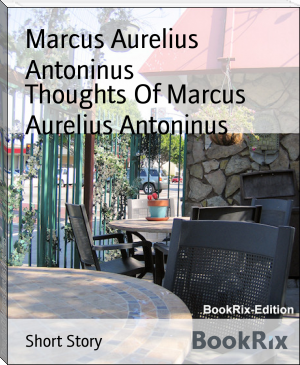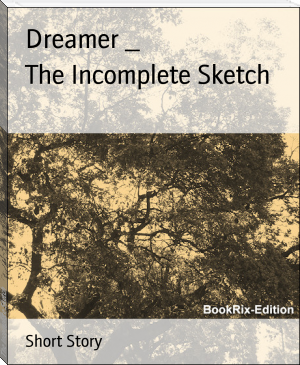Thoughts Of Marcus Aurelius Antoninus - Marcus Aurelius Antoninus (novels to read for beginners .TXT) 📗

- Author: Marcus Aurelius Antoninus
Book online «Thoughts Of Marcus Aurelius Antoninus - Marcus Aurelius Antoninus (novels to read for beginners .TXT) 📗». Author Marcus Aurelius Antoninus
38. It Is Not Right To Vex Ourselves At Things, For They Care Nought
About It.[B]
39. To The Immortal Gods And Us Give Joy.
40. Life Must Be Reaped Like The Ripe Ears Of Corn.
One Man Is Born; Another Dies.[C]
[A] Plato, Pol. Vi. 486.
[B] From The Bellerophon Of Euripides.
[C] From The Hypsipyle Of Euripides. Cicero (Tuscul. Iii. 25)
Has Translated Six Lines From Euripides, And Among Them Are
These Two Lines,--
"Reddenda Terrae Est Terra: Tum Vita Omnibus
Metenda Ut Fruges: Sic Jubet Necessitas."
41. If Gods Care Not For Me And My Children,
There Is A Reason For It.
42. For The Good Is With Me, And The Just.[A]
43. No Joining Others In Their Wailing,
No Violent Emotion.
44. From Plato:[B] But I Would Make This Man A Sufficient Answer, Which
Is This: Thou Sayest Not Well, If Thou Thinkest That A Man Who Is Good
For Anything At All Ought To Compute The Hazard Of Life Or Death, And
Should Not Rather Look To This Only In All That He Does, Whether He Is
Doing What Is Just Or Unjust, And The Works Of A Good Or Bad Man.
45. [C]For Thus It Is, Men Of Athens, In Truth: Wherever A Man Has
Placed Himself Thinking It The Best Place For Him, Or Has Been Placed By
A Commander, There In My Opinion He Ought To Stay And To Abide The
Hazard, Taking Nothing Into The Reckoning, Either Death Or Anything
Else, Before The Baseness [Of Deserting His Post].
[A] See Aristophanes, Acharnenses, V. 661.
[B] From The Apologia, C. 16.
[C] From The Apologia, C. 16.
46. But, My Good Friend, Reflect Whether That Which Is Noble And Good Is
Not Something Different From Saving And Being Saved; For+ As To A Man
Living Such Or Such A Time, At Least One Who Is Really A Man, Consider
If This Is Not---A Thing To Be Dismissed From The Thoughts:+ And There
Must Be No Love Of Life: But As To These Matters A Man Must Intrust Them
To The Deity And Believe What The Women Say, That No Man Can Escape His
Destiny, The Next Inquiry Being How He May Best Live The Time That He
Has To Live.[A]
47. Look Round At The Courses Of The Stars, As If Thou Wert Going Along
With Them; And Constantly Consider The Changes Of The Elements Into One
Another, For Such Thoughts Purge Away The Filth Of The Terrene Life.
Story 3 (The Thoughts Of Marcus Aurelius Antonius) Pg 7848. This Is A Fine Saying Of Plato:[B] That He Who Is Discoursing About
Men Should Look Also At Earthly Things As If He Viewed Them From Some
Higher Place; Should Look At Them In Their Assemblies, Armies,
Agricultural Labors, Marriages, Treaties, Births, Deaths, Noise Of The
Courts Of Justice, Desert Places, Various Nations Of Barbarians, Feasts,
Lamentations, Markets, A Mixture Of All Things And An Orderly
Combination Of Contraries.
[A] Plato, Gorgias, C. 68 (512). In This Passage The Text Of
Antoninus Has [Greek: Eateon], Which Is Perhaps Right; But
There Is A Difficulty In The Words [Greek: Mê Gar Touto Men,
To Zên Hoposondê Chronon Tonge Hôs Alêthos Andra Eateon Esti, Kai
Ou] &C. The Conjecture [Greek: Eukteon] For [Greek: Eateon]
Does Not Mend The Matter.
[B] It Is Said That This Is Not In The Extant Writings Of
Plato.
49. Consider The Past,--Such Great Changes Of Political Supremacies;
Thou Mayest Foresee Also The Things Which Will Be. For They Will
Certainly Be Of Like Form, And It Is Not Possible That They Should
Deviate From The Order Of The Things Which Take Place Now; Accordingly
To Have Contemplated Human Life For Forty Years Is The Same As To Have
Contemplated It For Ten Thousand Years. For What More Wilt Thou See?
50. That Which Has Grown From The Earth To The Earth,
But That Which Has Sprung From Heavenly Seed,
Back To The Heavenly Realms Returns.[A]
This Is Either A Dissolution Of The Mutual Involution Of The Atoms, Or A
Similar Dispersion Of The Unsentient Elements.
51. With Food And Drinks And Cunning Magic Arts
Turning The Channel's Course To 'Scape From Death.[B]
The Breeze Which Heaven Has Sent
We Must Endure, And Toil Without Complaining.
[A] From The Chrysippus Of Euripides.
[B] The First Two Lines Are From The Supplices Of Euripides, V.
1110.
52. Another May Be More Expert In Casting His Opponent; But He Is Not
More Social, Nor More Modest, Nor Better Disciplined To Meet All That
Happens, Nor More Considerate With Respect To The Faults Of His
Neighbors.
53. Where Any Work Can Be Done Conformably To The Reason Which Is Common
To Gods And Men, There We Have Nothing To Fear; For Where We Are Able
To Get Profit By Means Of The Activity Which Is Successful And Proceeds
According To Our Constitution, There No Harm Is To Be Suspected.
54. Everywhere And At All Times It Is In Thy Power Piously To Acquiesce
In Thy Present Condition, And To Behave, Justly To Those Who Are About
Thee, And To Exert Thy Skill Upon Thy Present Thoughts, That Nothing
Story 3 (The Thoughts Of Marcus Aurelius Antonius) Pg 79Shall Steal Into Them Without Being Well Examined.
55. Do Not Look Around Thee To Discover Other Men's Ruling Principles,
But Look Straight To This, To What Nature Leads Thee, Both The Universal
Nature Through The Things Which Happen To Thee, And Thy Own Nature
Through The Acts Which Must Be Done By Thee. But Every Being Ought To Do
That Which Is According To Its Constitution; And All Other Things Have
Been Constituted For The Sake Of Rational Beings, Just As Among
Irrational Things The Inferior For The Sake Of The Superior, But The
Rational For The Sake Of One Another.
The Prime Principle Then In Man's Constitution Is The Social. And The
Second Is Not To Yield To The Persuasions Of The Body,--For It Is The
Peculiar Office Of The Rational And Intelligent Motion To Circumscribe
Itself, And Never To Be Overpowered Either By The Motion Of The Senses
Or Of The Appetites, For Both Are Animal: But The Intelligent Motion
Claims Superiority, And Does Not Permit Itself To Be Overpowered By The
Others. And With Good Reason, For It Is Formed By Nature To Use All Of
Them. The Third Thing In The Rational Constitution Is Freedom From Error
And From Deception. Let Then The Ruling Principle Holding Fast To These
Things Go Straight On, And It Has What Is Its Own.
56. Consider Thyself To Be Dead, And To Have Completed Thy Life Up To
The Present Time; And Live According To Nature The Remainder Which Is
Allowed Thee.
57. Love That Only Which Happens To Thee And Is Spun With The Thread Of
Thy Destiny. For What Is More Suitable?
58. In Everything Which Happens Keep Before Thy Eyes Those To Whom The
Same Things Happened, And How They Were Vexed, And Treated Them As
Strange Things, And Found Fault With Them: And Now Where Are They?
Nowhere. Why Then Dost Thou Too Choose To Act In The Same Way? And Why
Dost Thou Not Leave These Agitations Which Are Foreign To Nature To
Those Who Cause Them And Those Who Are Moved By Them; And Why Art Thou
Not Altogether Intent Upon The Right Way Of Making Use Of The Things
Which Happen To Thee? For Then Thou Wilt Use Them Well, And They Will Be
A Material For Thee [To Work On]. Only Attend To Thyself, And Resolve To
Be A Good Man In Every Act Which Thou Doest: And Remember ...[A]
[A] This Section Is Obscure, And The Conclusion Is So Corrupt
That It Is Impossible To Give Any Probable Meaning To It. It Is
Better To Leave It As It Is Than To Patch It Up, As Some
Critics And Translators Have Done.
59. Look Within. Within Is The Fountain Of Good, And It Will Ever Bubble
Up, If Thou Wilt Ever Dig.
60. The Body Ought To Be Compact, And To Show No Irregularity Either In
Motion Or Attitude. For What The Mind Shows In The Face By Maintaining
In It The Expression Of Intelligence And Propriety, That Ought To Be
Required Also In The Whole Body. But All These Things Should Be Observed
Without Affectation.
61. The Art Of Life Is More Like The Wrestler's Art Than The Dancer's,
In Respect Of This, That It Should Stand Ready And Firm To Meet Onsets
Which Are Sudden And Unexpected.
Story 3 (The Thoughts Of Marcus Aurelius Antonius) Pg 80
62. Constantly Observe Who Those Are Whose Approbation Thou Wishest To
Have, And What Ruling Principles They Possess. For Then Thou Wilt
Neither Blame Those Who Offend Involuntarily, Nor Wilt Thou Want Their
Approbation, If Thou Lookest To The Sources Of Their Opinions And
Appetites.
63. Every Soul, The Philosopher Says, Is Involuntarily Deprived Of
Truth; Consequently In The Same Way It Is Deprived Of Justice And
Temperance And Benevolence And Everything Of The Kind. It Is Most
Necessary To Bear This Constantly In Mind, For Thus Thou Wilt Be More
Gentle Towards All.
64. In Every Pain Let This Thought Be Present, That There Is No Dishonor
In It, Nor Does It Make The Governing Intelligence Worse, For It Does
Not Damage The Intelligence Either So Far As The Intelligence Is
Rational[A] Or So Far As It Is Social. Indeed In The Case Of Most Pains
Let This Remark Of Epicurus Aid Thee, That Pain Is Neither Intolerable
Nor Everlasting, If Thou Bearest In Mind That It Has Its Limits, And If
Thou Addest Nothing To It In Imagination: And Remember This Too, That We
Do Not Perceive That Many Things Which Are Disagreeable To Us Are The
Same As Pain, Such As Excessive Drowsiness, And The Being Scorched By
Heat, And The Having No Appetite. When Then Thou Art Discontented About
Any Of These Things, Say To Thyself That Thou Art Yielding To Pain.
65. Take Care Not To Feel Towards The Inhuman As They Feel Towards
Men.[B]
66. How Do We Know If Telauges Was Not Superior In Character To
Socrates? For It Is Not Enough That Socrates Died A More Noble Death,
And Disputed More Skilfully With





Comments (0)